BusinessEurope Headlines No. 2017-18
Beyrer: “EU going digital is no option but a necessity”, in Vilnius
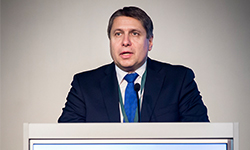 Upon invitation from the Lithuanian Confederation of Industrialists (LPK) BusinessEurope Director General Markus J. Beyrer participated in the international conference “Getting Ready for Industry 4.0: Transformations Needed” on 11 May. The conference focused on the digitalisation of industry both on European and national policy level. Beyrer underlined that “going digital” is no longer an option but a clear necessity for Europe, both from an economic but also from a social perspective. On EU level, BusinessEurope particularly supports and encourages cross-border coordination and cooperation of national strategies and will continue to monitor this development. Photos of the event can be found here.
Upon invitation from the Lithuanian Confederation of Industrialists (LPK) BusinessEurope Director General Markus J. Beyrer participated in the international conference “Getting Ready for Industry 4.0: Transformations Needed” on 11 May. The conference focused on the digitalisation of industry both on European and national policy level. Beyrer underlined that “going digital” is no longer an option but a clear necessity for Europe, both from an economic but also from a social perspective. On EU level, BusinessEurope particularly supports and encourages cross-border coordination and cooperation of national strategies and will continue to monitor this development. Photos of the event can be found here.
Contact: Jasmin Ploner
Greece going digital: national strategies must suit local needs
 On 12 May, Director General Markus J. Beyrer spoke at a two-day conference on a “Digital Strategy for Greece – Path to Growth” organised by the Hellenic Federation of Enterprises (SEV) in Athens. His panel discussed the critical steps and prerequisites for a successful Digital Strategy Transformation Roadmap in Greece and the role of the Digital Single Market. Beyrer particularly stressed the importance for national strategies to be tailored to suit local needs, cooperate and learn from other national strategies and, at the same time understand the global potential and relevance of the actions taken at a European level. Please find here photos, an interview and a video of the discussion.
On 12 May, Director General Markus J. Beyrer spoke at a two-day conference on a “Digital Strategy for Greece – Path to Growth” organised by the Hellenic Federation of Enterprises (SEV) in Athens. His panel discussed the critical steps and prerequisites for a successful Digital Strategy Transformation Roadmap in Greece and the role of the Digital Single Market. Beyrer particularly stressed the importance for national strategies to be tailored to suit local needs, cooperate and learn from other national strategies and, at the same time understand the global potential and relevance of the actions taken at a European level. Please find here photos, an interview and a video of the discussion.
Contact: Jasmin Ploner
EU-Japan FTA negotiations moving forward
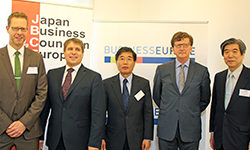 “BusinessEurope follows these negotiations very closely; we believe there is a lot of potential for both sides in an ambitious and comprehensive free-trade agreement”, Markus J. Beyrer, Director General of BusinessEurope, said at an EU-Japan breakfast meeting on 17 May. For European business, this means an ambitious chapter on market access, a good agreement on non-tariff barriers, adequate protection of geographical indications, a far-reaching chapter on public procurement, and including a strong mechanism of regulatory cooperation. Improved access to services and investment is also crucial. Yoichi Suzuki, the chief trade negotiator for Japan, subsequently highlighted that the EU is an ideal partner for Japan and has an ideal model of trade liberalisation and concern for consumer safety. “The current uncertainties in the global trading system”, Mr Beyrer concluded, “imply that our agreement will also help reinforce the message that we stand for open and rule-based trade”. The breakfast discussion was co-hosted by BusinessEurope and the Japan Business Council in Europe (JBCE). Photos of the event can be found here.
“BusinessEurope follows these negotiations very closely; we believe there is a lot of potential for both sides in an ambitious and comprehensive free-trade agreement”, Markus J. Beyrer, Director General of BusinessEurope, said at an EU-Japan breakfast meeting on 17 May. For European business, this means an ambitious chapter on market access, a good agreement on non-tariff barriers, adequate protection of geographical indications, a far-reaching chapter on public procurement, and including a strong mechanism of regulatory cooperation. Improved access to services and investment is also crucial. Yoichi Suzuki, the chief trade negotiator for Japan, subsequently highlighted that the EU is an ideal partner for Japan and has an ideal model of trade liberalisation and concern for consumer safety. “The current uncertainties in the global trading system”, Mr Beyrer concluded, “imply that our agreement will also help reinforce the message that we stand for open and rule-based trade”. The breakfast discussion was co-hosted by BusinessEurope and the Japan Business Council in Europe (JBCE). Photos of the event can be found here.
Contact: Maurice Fermont
Mobility Package must truly support road transport
 Road transport is important for the free movement of goods, services and people throughout the EU Single Market. How efficient transport and logistics companies can transport their goods via road directly impacts cost, mobility and competitiveness. At the same time, we have to make transport more sustainable, also linked to the application of ICT tools and digital solutions to improve logistics. “We expect a lot from the upcoming Mobility Package with concrete measures to support road transport”, this was stressed by Director General Markus J. Beyrer in a meeting with European Commission Vice-President Maroš Šefčovič and Transport Commissioner Violeta Bulc in a meeting with EU Social Partners on 15 May. We stress once again that EU rules on posting of workers should not apply to international road transport operations. This would be unworkable for transport companies also in terms of administrative burden. Focus should rather be on ensuring stronger enforcement of existing rules to solve many of the existing problems in the road sector.
Road transport is important for the free movement of goods, services and people throughout the EU Single Market. How efficient transport and logistics companies can transport their goods via road directly impacts cost, mobility and competitiveness. At the same time, we have to make transport more sustainable, also linked to the application of ICT tools and digital solutions to improve logistics. “We expect a lot from the upcoming Mobility Package with concrete measures to support road transport”, this was stressed by Director General Markus J. Beyrer in a meeting with European Commission Vice-President Maroš Šefčovič and Transport Commissioner Violeta Bulc in a meeting with EU Social Partners on 15 May. We stress once again that EU rules on posting of workers should not apply to international road transport operations. This would be unworkable for transport companies also in terms of administrative burden. Focus should rather be on ensuring stronger enforcement of existing rules to solve many of the existing problems in the road sector.
![]() Contact: Jeroen Hardenbol
Contact: Jeroen Hardenbol
SME Committee meets COSME programme Director Kristin Schreiber
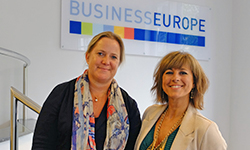 “The mid-term review of the COSME programme (the EU programme for enhancing the competitiveness of SMEs) should go hand in hand with a reflection on how to ensure the continued deployment of a well-designed portfolio of EU pro-SME initiatives”, said Marta Marti, Chair of BusinessEurope’s “Entrepreneurship and SME” Committee when meeting Kristin Schreiber Director of the COSME programme at the European Commission DG GROW on 11 May. At a time where the Commission strategy in the area of innovation is being redesigned, it is important to keep a broad-based approach in particular for promoting innovation by SMEs. DG GROW should contribute to this reflection. This topic and the organisation of the COSME mid-term review were discussed between Mrs Schreiber and the SME Committee at its meeting on 11 May. BusinessEurope will prepare various contributions on this subject in the coming weeks.
“The mid-term review of the COSME programme (the EU programme for enhancing the competitiveness of SMEs) should go hand in hand with a reflection on how to ensure the continued deployment of a well-designed portfolio of EU pro-SME initiatives”, said Marta Marti, Chair of BusinessEurope’s “Entrepreneurship and SME” Committee when meeting Kristin Schreiber Director of the COSME programme at the European Commission DG GROW on 11 May. At a time where the Commission strategy in the area of innovation is being redesigned, it is important to keep a broad-based approach in particular for promoting innovation by SMEs. DG GROW should contribute to this reflection. This topic and the organisation of the COSME mid-term review were discussed between Mrs Schreiber and the SME Committee at its meeting on 11 May. BusinessEurope will prepare various contributions on this subject in the coming weeks.
Contact: Daniel Cloquet
Childcare infrastructures are the key to improve work-life balance, not leaves
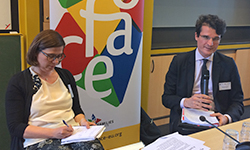 “Employers disagree that granting more leaves at European level will lead to better reconciliation between work and private life. Unfortunately, the European Commission focused its proposed measures on the wrong policy option. The widely-recognised policy measure which balances costs with stronger economic growth is the setting up of quality childcare infrastructures. This is because childcare infrastructures allow both parents to work”. These were the key messages by Maxime Cerutti, Social Affairs Director, in a first public event since the Commission published its package of legislative and non-legislative initiatives to support work-life balance of working parents and carers, organised by COFACE on 12 May. “By introducing new leaves for fathers and carers and increasing the level of financial compensation for all family leaves to sickness pay, it is likely that more mothers and fathers will choose to be on leave. This will create significant additional non-wage labour costs for European enterprises hampering job creation, whereas EU companies already face a much higher tax wedge on labour compared to other advanced economies globally”, he added.
“Employers disagree that granting more leaves at European level will lead to better reconciliation between work and private life. Unfortunately, the European Commission focused its proposed measures on the wrong policy option. The widely-recognised policy measure which balances costs with stronger economic growth is the setting up of quality childcare infrastructures. This is because childcare infrastructures allow both parents to work”. These were the key messages by Maxime Cerutti, Social Affairs Director, in a first public event since the Commission published its package of legislative and non-legislative initiatives to support work-life balance of working parents and carers, organised by COFACE on 12 May. “By introducing new leaves for fathers and carers and increasing the level of financial compensation for all family leaves to sickness pay, it is likely that more mothers and fathers will choose to be on leave. This will create significant additional non-wage labour costs for European enterprises hampering job creation, whereas EU companies already face a much higher tax wedge on labour compared to other advanced economies globally”, he added.
Contact: Guillaume Cravero
BusinessEurope discusses future MFF with Nadia Calvino
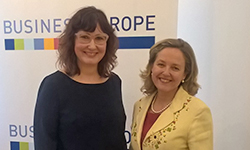 During a task force meeting on the EU’s Multiannual Financial Framework (MFF), taking place 16 May, BusinessEurope welcomed Ms Nadia Calvino, Director-General of Budget at the European Commission. BusinessEurope stressed the importance of the MFF to reflect and help delivering EU priorities, pointing out the important achievements made possible for companies and citizens through the EU budget, and stressed the need of ensuring that discussions on the next MFF are fully aligned with ongoing reflections on the Future of Europe.
During a task force meeting on the EU’s Multiannual Financial Framework (MFF), taking place 16 May, BusinessEurope welcomed Ms Nadia Calvino, Director-General of Budget at the European Commission. BusinessEurope stressed the importance of the MFF to reflect and help delivering EU priorities, pointing out the important achievements made possible for companies and citizens through the EU budget, and stressed the need of ensuring that discussions on the next MFF are fully aligned with ongoing reflections on the Future of Europe.
Contact: Joana Valente
Supervision of financial markets
 Do not make any significant changes to the structure, powers or responsibilities of the European Supervisory Authorities, BusinessEurope Director General Markus J. Beyrer wrote to European Commission Vice President Valdis Dombrovskis. In its position paper regarding the operations of the European Supervisory Authorities, BusinessEurope sets out that supervisory convergence is best achieved by safeguarding sectorial expertise and maintaining the current European financial supervisory architecture. The existing adoption process of international accounting standards should also be maintained. It is necessary though to improve the governance of the European Supervisory Authorities to ensure that decisions can be made on the basis of evidence-based information and to effectively involve all affected stakeholders.
Do not make any significant changes to the structure, powers or responsibilities of the European Supervisory Authorities, BusinessEurope Director General Markus J. Beyrer wrote to European Commission Vice President Valdis Dombrovskis. In its position paper regarding the operations of the European Supervisory Authorities, BusinessEurope sets out that supervisory convergence is best achieved by safeguarding sectorial expertise and maintaining the current European financial supervisory architecture. The existing adoption process of international accounting standards should also be maintained. It is necessary though to improve the governance of the European Supervisory Authorities to ensure that decisions can be made on the basis of evidence-based information and to effectively involve all affected stakeholders.
![]() Contact: Erik Berggren
Contact: Erik Berggren
EESC Expert Hearing on New Sustainable Economic Models
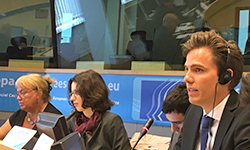 “Circular business models tend to differ widely between sectors, and the challenges that companies face when moving to more circular economy are often not policy-related. A one-size-fits-all policy therefore does not exist, and challenges should not necessarily be patched up with new regulation”, said BusinessEurope environment and climate advisor Leon de Graaf at an expert hearing on new sustainable economic models organised by the European Economic and Social Committee (EESC) on 16 May. “A successful shift to a circular economy in Europe starts with making best use of existing policies, and a strong inclusive role of all stakeholders in all Member States”, he added. BusinessEurope is developing a Circular Economy Industry Platform to showcase what companies are already doing, and what challenges they face to become even more “circular”. The industry platform will be launched during the Green Week on 31 May, and a follow-up event with European Commission Vice-President Jyrki Katainen, business and Member States will take place on 7 June.
“Circular business models tend to differ widely between sectors, and the challenges that companies face when moving to more circular economy are often not policy-related. A one-size-fits-all policy therefore does not exist, and challenges should not necessarily be patched up with new regulation”, said BusinessEurope environment and climate advisor Leon de Graaf at an expert hearing on new sustainable economic models organised by the European Economic and Social Committee (EESC) on 16 May. “A successful shift to a circular economy in Europe starts with making best use of existing policies, and a strong inclusive role of all stakeholders in all Member States”, he added. BusinessEurope is developing a Circular Economy Industry Platform to showcase what companies are already doing, and what challenges they face to become even more “circular”. The industry platform will be launched during the Green Week on 31 May, and a follow-up event with European Commission Vice-President Jyrki Katainen, business and Member States will take place on 7 June.
Contact: Leon de Graaf
How to sustain digital leadership?
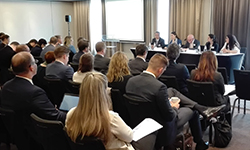 The U.S. Chamber of Commerce and BusinessEurope held an event at the Sofitel Brussels on 11 May to discuss the transatlantic digital economy. The first panel focused on fostering effective privacy regimes where the European Commission focused on supporting European privacy ideals worldwide whereas businesses raised concerns of General Data Protection Regulation (GDPR) fragmentation in Europe. The second panel centred around foresight of policy areas where further transatlantic digital leadership could be built. Businesses insisted on solving the issue of data localisation within the EU to better enable data flows between the EU and US. More digital champions are needed within the European Parliament to sustain our digital leadership. A recent letter sent to the Commission and the U.S. Administration that outlines these issues can be found here.
The U.S. Chamber of Commerce and BusinessEurope held an event at the Sofitel Brussels on 11 May to discuss the transatlantic digital economy. The first panel focused on fostering effective privacy regimes where the European Commission focused on supporting European privacy ideals worldwide whereas businesses raised concerns of General Data Protection Regulation (GDPR) fragmentation in Europe. The second panel centred around foresight of policy areas where further transatlantic digital leadership could be built. Businesses insisted on solving the issue of data localisation within the EU to better enable data flows between the EU and US. More digital champions are needed within the European Parliament to sustain our digital leadership. A recent letter sent to the Commission and the U.S. Administration that outlines these issues can be found here.
![]() Contact: Patrick Grant
Contact: Patrick Grant
Towards clear competition rules for digital markets
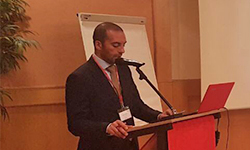 How should competition rules be applied in online and digital markets? This was one of key questions BusinessEurope Deputy Director Guido Lobrano addressed during the Lexxion Symposium on Competition Law and e-Commerce in the EU’s digital economy. While the recent report of the European Commission’s e-commerce inquiry is likely to lead to a clearer framework, it is also very important to achieve a more harmonized competition policy approach to enforcement in the online environment, especially in relation to distribution in online markets, as some of the restrictions may have significant effects on the openness of the online economy and on cross-border sales. Looking forward, the competition enforcement approach to data-intensive models might have relevant consequences on innovation, and although data use might in specific circumstances justify regulatory intervention, in most cases the acquisition and use of data does not seem to reduce competition, and the existing legal framework already provides regulators with the tools needed to protect markets and consumers.
How should competition rules be applied in online and digital markets? This was one of key questions BusinessEurope Deputy Director Guido Lobrano addressed during the Lexxion Symposium on Competition Law and e-Commerce in the EU’s digital economy. While the recent report of the European Commission’s e-commerce inquiry is likely to lead to a clearer framework, it is also very important to achieve a more harmonized competition policy approach to enforcement in the online environment, especially in relation to distribution in online markets, as some of the restrictions may have significant effects on the openness of the online economy and on cross-border sales. Looking forward, the competition enforcement approach to data-intensive models might have relevant consequences on innovation, and although data use might in specific circumstances justify regulatory intervention, in most cases the acquisition and use of data does not seem to reduce competition, and the existing legal framework already provides regulators with the tools needed to protect markets and consumers.
Contact: Guido Lobrano
EU External Investment Plan – how will it work in practice?
 BusinessEurope hosted an event on the upcoming EU External Investment Plan on 16 May, where Members had the opportunity to exchange views with representatives from the European Commission’s Directorate General on International Cooperation and Development. The External Investment Plan which could become operational in autumn 2017, aims at supporting investment in neighbouring countries – including Africa – strengthen partnerships, promote a new model of participation of the private sector and contribute to achieving the Sustainable Development Goals. It is composed of three pillars: (1) Mobilising Investments – through a new guarantee that will be created under the External Fund for Sustainable Development (EFSD) with the objective to leverage additional financing from the private sector by reducing the risk. (2) Technical Assistance – to develop financially attractive projects and help attract investments and (3) Improving the Business Environment – through better governance and engagement with the private sector. Although the final structure of the Plan is currently under consideration by the EU Council and the European Parliament, several possibilities for engagement should be available for the private sector. For instance, under the 1st pillar (financing), business can provide input in the process of identification of policy areas where projects can be developed. Also, under the 3rd pillar (business environment), private sector can discuss the challenges they face when they invest, including on the regulatory environment and business climate. BusinessEurope will seek to organise similar exchanges in the future, to learn more about the External Investment Plan and ensure the effective participation of the European private sector in this important initiative.
BusinessEurope hosted an event on the upcoming EU External Investment Plan on 16 May, where Members had the opportunity to exchange views with representatives from the European Commission’s Directorate General on International Cooperation and Development. The External Investment Plan which could become operational in autumn 2017, aims at supporting investment in neighbouring countries – including Africa – strengthen partnerships, promote a new model of participation of the private sector and contribute to achieving the Sustainable Development Goals. It is composed of three pillars: (1) Mobilising Investments – through a new guarantee that will be created under the External Fund for Sustainable Development (EFSD) with the objective to leverage additional financing from the private sector by reducing the risk. (2) Technical Assistance – to develop financially attractive projects and help attract investments and (3) Improving the Business Environment – through better governance and engagement with the private sector. Although the final structure of the Plan is currently under consideration by the EU Council and the European Parliament, several possibilities for engagement should be available for the private sector. For instance, under the 1st pillar (financing), business can provide input in the process of identification of policy areas where projects can be developed. Also, under the 3rd pillar (business environment), private sector can discuss the challenges they face when they invest, including on the regulatory environment and business climate. BusinessEurope will seek to organise similar exchanges in the future, to learn more about the External Investment Plan and ensure the effective participation of the European private sector in this important initiative.
Contact: Sofia Bournou
Towards a genuine partnership for labour market reforms
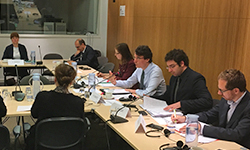 “The European social dimension should focus on supporting EU Member States coming forward with the labour markets reforms that are needed to increase Europe’s long-term economic growth potential and job creation. The European semester is an important vehicle to identify and implement the necessary policy adaptations in the Member States. On labour markets, social partners play an important to design, implement and evaluate policies. We need to learn from each other and develop know-how for Member States and Social Partners to actually deliver the reforms needed”. These were the key messages by Social Affairs Director Maxime Cerutti in a seminar organised by the European Social Partners on 15 May to discuss Social Partner involvement in economic governance processes and the European semester. “Today’s discussions showed that there is a willingness on both sides, employers and trade unions, to engage constructively on this shared agenda. Together with the European Commission and EU Member States, we now should take this partnership a step forward and make it deliver tangible results”, he added.
“The European social dimension should focus on supporting EU Member States coming forward with the labour markets reforms that are needed to increase Europe’s long-term economic growth potential and job creation. The European semester is an important vehicle to identify and implement the necessary policy adaptations in the Member States. On labour markets, social partners play an important to design, implement and evaluate policies. We need to learn from each other and develop know-how for Member States and Social Partners to actually deliver the reforms needed”. These were the key messages by Social Affairs Director Maxime Cerutti in a seminar organised by the European Social Partners on 15 May to discuss Social Partner involvement in economic governance processes and the European semester. “Today’s discussions showed that there is a willingness on both sides, employers and trade unions, to engage constructively on this shared agenda. Together with the European Commission and EU Member States, we now should take this partnership a step forward and make it deliver tangible results”, he added.
Contact: Guillaume Cravero
European Business Summit on 22-23 May in Brussels
 What is the future of the European industry? How can we make companies more competitive? How to stop and reverse the decline of manufacturing in Europe? How to catch up with countries leading the digital revolution? Are we prepared to tackle the challenge of a changing global trade scenario? Nationalism and protectionism are real threats casting long shadows on the European project, so what can be the new, pro-European narrative making this project attractive and exciting again for Europe’s citizens? Join the debate on 22-23 May; see how German Finance Minister Wolfgang Schäuble, British Chancellor of the Exchequer Philip Hammond, Spanish Minister of Economy Luis de Guindos Jurado, BusinessEurope’s President Emma Marcegaglia and Director General Markus J. Beyrer and other keynote speakers and business leaders will answer these questions at the European Business Summit!
What is the future of the European industry? How can we make companies more competitive? How to stop and reverse the decline of manufacturing in Europe? How to catch up with countries leading the digital revolution? Are we prepared to tackle the challenge of a changing global trade scenario? Nationalism and protectionism are real threats casting long shadows on the European project, so what can be the new, pro-European narrative making this project attractive and exciting again for Europe’s citizens? Join the debate on 22-23 May; see how German Finance Minister Wolfgang Schäuble, British Chancellor of the Exchequer Philip Hammond, Spanish Minister of Economy Luis de Guindos Jurado, BusinessEurope’s President Emma Marcegaglia and Director General Markus J. Beyrer and other keynote speakers and business leaders will answer these questions at the European Business Summit!
Calendar
 22-23 May 2017: European Business Summit, Brussels
22-23 May 2017: European Business Summit, Brussels- 26-27 May 2017: G7 summit, Taormina, Italy
- 29-30 May 2017: Competitiveness Council, Brussels
- 29 May - 2 June 2017: EU Green Week
